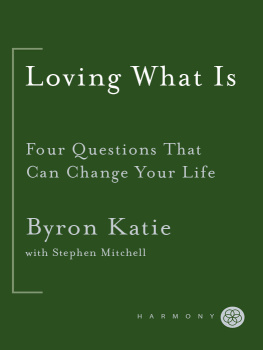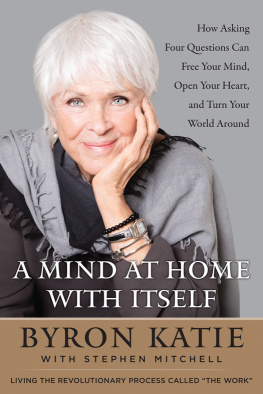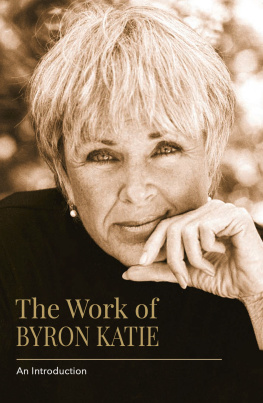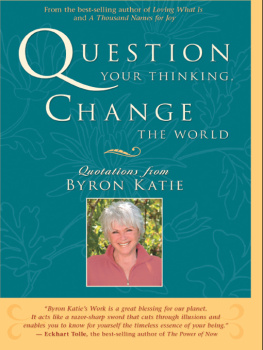Praise for
LOVING WHAT IS
Good Lord! Where did Byron Katie come from? Shes the real McCoy. Her work is amazingly effectivea simple, straightforward antidote to the suffering we unnecessarily create for ourselves. She asks us to believe nothing, but provides a surprisingly effective and simple way to cut through the tangle of delusions we wrap ourselves in. Just reading the exchanges in Loving What Is, I can admit things I didnt want to admit and stop torturing myself in ways I didnt realize I was doing.
David Chadwick, author of Crooked Cucumber: The Life and Zen Teaching of Shunryu Suzuki
Suppose you could find a simple way to embrace your life with joy, stop arguing with reality, and achieve serenity in the midst of chaos. That is what Loving What Is offers. It is no less than a revolutionary way to live your life. The question is: Are we brave enough to accept it?
Erica Jong, author of Fear of Flying
Loving What Is is filled with the essence of wisdom. Katies Work is a wonderful, transformative practice for anyone interested in spiritual growth.
Lama Surya Das, author of Awakening the Buddha Within
Byron Katies Work is a great blessing for our planet. The root cause of suffering is identification with our thoughts, the stories that are continuously running through our minds. Byron Katies Work acts like a razor-sharp sword that cuts through that illusion and enables you to know for yourself the timeless essence of your being. Joy, peace, and love emanate from it as your natural state. In Loving What Is, you have the key. Now use it.
Eckhart Tolle, author of The Power of Now
Copyright 2002 by Byron Kathleen Mitchell
All rights reserved. No part of this book may be reproduced or transmitted in any form or by any means, electronic or mechanical, including photocopying, recording, or by any information storage and retrieval system, without permission in writing from the publisher.
Published in the United States by Harmony Books, an imprint of the Crown Publishing Group, a division of Random House LLC, a Penguin Random House Company, New York.
www.crownpublishing.com
HARMONY BOOKS is a registered trademark, and the Circle colophon is a trademark of Random House LLC.
Originally published in hardcover by Harmony Books, an imprint of the Crown Publishing Group, a division of Random House LLC, New York, in 2002, and subsequently published in paperback by Three Rivers Press, an imprint of the Crown Publishing Group, a division of Random House LLC, New York, in 2003.
Design by David Bullen
Library of Congress Cataloging-in-Publication Data Katie, Byron.
Loving what is : four questions that can change your life / the work of Byron Katie; written with Stephen Mitchell.
p. cm.
1. Self-actualization (Psychology) 2. Self-acceptance. I. Mitchell, Stephen, 1943 II. Title.
BF637.S4 K336 2003
158.1dc21 2002010852
ISBN 1-4000-4537-1
eBook ISBN: 978-1-4000-4546-4
v3.1_r2
To Adam Joseph Lewis and to Michael
Contents
Introduction

The more clearly you understand yourself and your emotions, the more you become a lover of what is.
Baruch Spinoza
The first time I watched The Work, I realized that I was witnessing something truly remarkable. What I saw was a succession of people, young and old, educated and uneducated, who were learning to question their own thoughts, the thoughts that were most painful to them. With the lovingly incisive help of Byron Katie (everyone calls her Katie), these people were finding their way not only toward the resolution of their immediate problems, but also toward a state of mind in which the deepest questions are resolved. I have spent a good part of my life studying and translating the classic texts of the great spiritual traditions, and I recognized something very similar in process here. At the core of these traditionsin works such as the Book of Job, the Tao Te Ching, and the Bhagavad Gitathere is an intense questioning about life and death, and a profound, joyful wisdom that emerges as an answer. That wisdom, it seemed to me, was the place Katie was standing in, and the direction where these people were headed.
As I watched from my seat in a crowded community center, five men and women, one after another, were learning freedom through the very thoughts that had caused their suffering, thoughts such as My husband betrayed me or My mother doesnt love me enough. Simply by asking four questions and listening to the answers they found inside themselves, these people were opening their minds to profound, spacious, and life-transforming insights. I saw a man who had been suffering for decades from anger and resentment toward his alcoholic father light up before my eyes within forty-five minutes. I saw a woman who had been almost too frightened to speak, because she had just found out that her cancer was spreading, end the session in a glow of understanding and acceptance. Three out of the five people had never done The Work before, yet the process didnt seem to be more difficult for them than it was for the other two, nor were their realizations any less profound. They all began by realizing a truth so basic that it is usually invisible: the fact that (in the words of the Greek philosopher Epictetus) we are disturbed not by what happens to us, but by our thoughts about what happens. As soon as they grasped that truth, their whole understanding changed.
Before people have experienced The Work of Byron Katie for themselves, they often think that it is too simple to be effective. But its simplicity is precisely what makes it so effective. Over the past two years, since Katie and I met (we are now married), I have done The Work many times, on thoughts I hadnt even been aware of. And Ive watched more than a thousand people do it in public events across the United States and Europe, on the whole gamut of human problems: from major illnesses, the deaths of parents and children, sexual and psychological abuse, addictions, financial insecurity, professional problems, and social issues to the usual frustrations of daily life. Again and again, I have seen The Work quickly and radically transform the way people think about their problems. And as the thinking changes, the problems disappear.
Suffering is optional, Katie says. Whenever we experience a stressful feelinganything from mild discomfort to intense sorrow, rage, or despairwe can be certain that there is a specific thought causing our reaction, whether or not we are conscious of it. The way to end our stress is to investigate the thinking that lies behind it, and anyone can do this by himself with a piece of paper and a pen. The Works four questions, which you will see in context later in this introduction, reveal where our thinking isnt true for us. Through this processKatie also calls it inquirywe discover that all the concepts and judgments that we believe or take for granted are distortions of things as they really are. When we believe our thoughts instead of what is really true for us, we experience the kinds of emotional distress that we call suffering. Suffering is a natural alarm, warning us that were attaching to a thought; when we dont listen, we come to accept this suffering as an inevitable part of life. Its not.
The Work has striking similarities with the Zen koan and the Socratic dialogue. But it doesnt stem from any tradition, Eastern or Western. It is American, homegrown, and mainstream, having originated in the mind of an ordinary woman who had no intention of originating anything.












